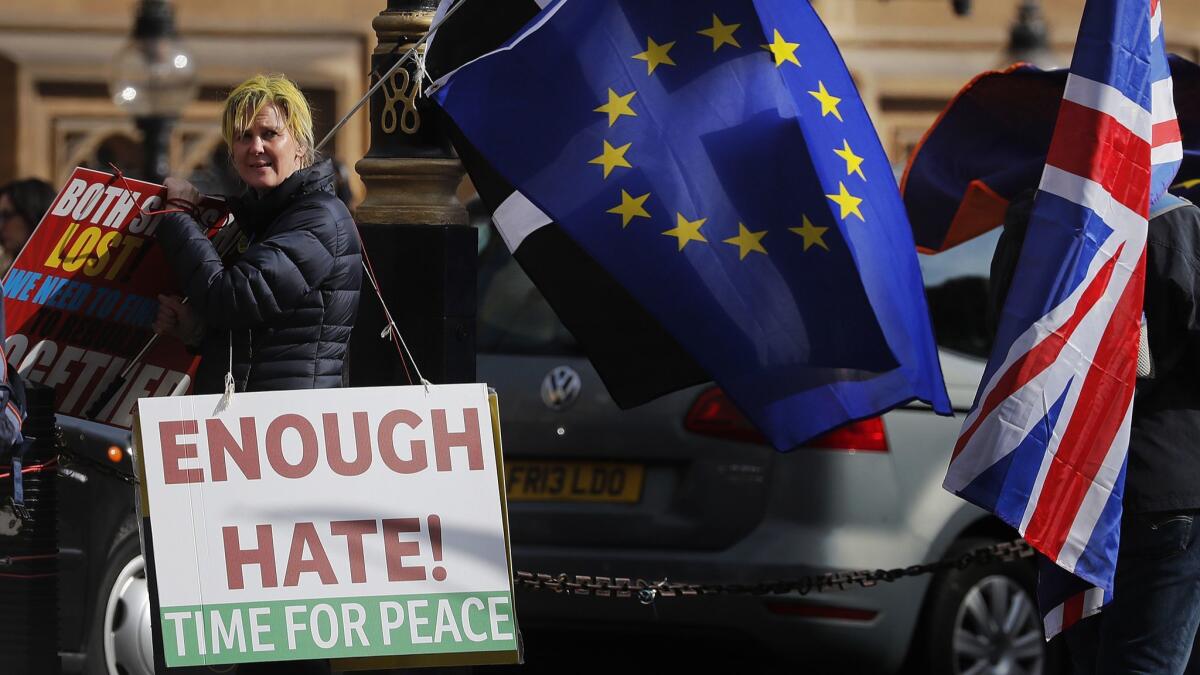British government defiant as Parliament takes control of Brexit

British lawmakers were preparing to blow open the Brexit process and put a host of rejected options back on the table — including keeping the U.K. close to the European Union or even remaining a member — as Prime Minister Theresa May defiantly insisted Tuesday that Parliament should approve her twice-defeated divorce deal instead.
Lawmakers are scheduled to vote Wednesday on multiple flavors of Brexit, after the House of Commons voted to wrest the parliamentary timetable away from May’s weakened government and hold votes on alternatives to her rejected withdrawal agreement.
The largely pro-EU legislators behind the unprecedented move hope to find a form of Brexit that can command a majority in Parliament. Votes are due to be held Wednesday on options that could include remaining in the EU’s single market and customs union, calling a new membership referendum and canceling Brexit — all ideas that May has repeatedly rejected.
They plan to see which ideas have the most support, and then hold another day of votes next week to try to find agreement on a proposal.
The government, which usually controls the scheduling of votes in Parliament, said the lawmakers’ move “upends the balance between our democratic institutions and sets a dangerous, unpredictable precedent for the future.”
The votes will not be legally binding, and Health Secretary Matt Hancock told the BBC that the government wouldn’t “pre-commit” to accepting the option backed by lawmakers because they may come up with a plan that is impractical. It’s also possible lawmakers could support contradictory options, or none at all.
“If the Commons voted for the sun to rise in the west, the government would not be able to implement that,” he said.
“The best way through this impasse is the one deal that has been negotiated with the EU that can be delivered quickly now,” Hancock said, referring to the prime minister’s agreement.
But government officials acknowledged they were no longer in control of Brexit. May’s authority was hanging by a thread after 30 members of her Conservative Party defied her instructions and voted late Monday for Parliament to take control of the process. Three government ministers resigned rather than vote with the government.
Almost three years after Britons voted to leave the EU, the date and terms of its departure are up in the air. Last week, the EU granted Britain a delay to the scheduled March 29 exit date, saying that if Parliament approved the proposed divorce deal, the U.K. would leave the EU on May 22. If not, the government has until April 12 to tell the 27 remaining EU countries what it plans to do — leave without a deal, cancel Brexit or propose a radically new path.
EU officials, exasperated by months of British political gridlock, welcomed Parliament’s move to take control.
The EU legislature’s top Brexit official, Guy Verhofstadt, said the U.K. lawmakers’ votes could dramatically alter the course of the U.K.’s departure.
“It is possible now to work in Britain toward a cross-party alliance,” he said.
More to Read
Start your day right
Sign up for Essential California for news, features and recommendations from the L.A. Times and beyond in your inbox six days a week.
You may occasionally receive promotional content from the Los Angeles Times.






